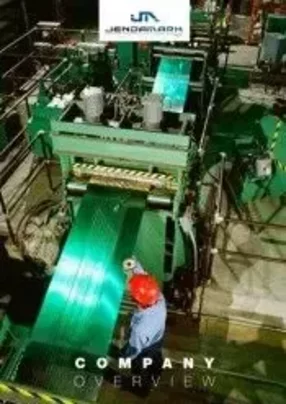Established in 1989, Jendamark Automation provides production solutions, predominantly to the automotive industry, with the pharmaceutical, food and beverage and packing industries benefiting from its services. The company has more than 18 years worth of turnkey projects and special purpose machinery experience under its belt and takes pride in its ability to provide world-class production lines and assembly facilities to export orientated customers.
From conceptual to final design, manufacture, assembly, software engineering, commissioning and training with after sales service and support, Jendamark is able to offer its customers more than machines. Jendamark works with a broad range of international companies, and as such has a successful component sales and marketing team with representatives globally.
Focusing on people
One thing that sets Jendamark aside from the competition is its focus on people. On the company’s website it states, “We make it our business to get to know the people we deal with, to understand their expectations and their needs, and to gain an intimate knowledge of their long term goals and immediate challenges,” and Quinton Uren, Managing Director, echoes this sentiment. “We listen to our customers needs and work with them to develop solutions they want,” he says.
Couple this commitment to its clients with almost 20 years experience in turnkey projects and developing special purpose machinery, and it is clear why Jendamark Automation are leaders in the field of providing world class production lines and assembly facilities.
“When you deal with Jendamark Automation you’re investing in more than a tangible, final product. You’re investing in a relationship that offers you support every step of the way, from conceptual planning to final design; from mechanical engineering to software development; and from the initial training to after-sales service and support,” says Uren.
Developing customer-centric operations
One of the biggest challenges facing Jendamark is a skills shortage in South Africa. With this in mind the company has developed a lot of in-house training programs in design, process management and business strategy in general. It teaches all of its employees not only how to make its machines, but how to manufacture them to customer specifications in the export market.
“We have customers in emerging markets such as China and India, which tend to have very manual operations, and then we have customers in the developed world - so the U.S. and Europe - who look for total automation. We offer solutions to all these customers and hybrid alternatives for everyone in between,” explains Uren.
The company also works very closely with local universities, and has recently established an apprenticeship scheme, which is proving very successful so far.
Overcoming distance-to-market challenges
Everything Jendamark does, every decision the company makes, is driven by customer demand. It manufactures all its systems in South Africa, however its distance to market can be a challenge.
“Our machines are quite large so we have an additional eight weeks of shipping and customs clearance before we reach markets in the northern hemisphere,” explains Uren. “With this in mind we have to be ahead of the curve and ensure our customers want our products. We have to work closely with them and listen to their needs to predict the solutions they will require in six-months, one-year, three-years time.”
Research and development
To second-guess the next big market trends, Jendamark has recently established its own R&D department, made up of experts within the business. “The newly formed team is working on standardization of equipment and systems, product development and market analysis,” says Uren.
The R&D team develop new solutions, build prototypes, test them in-house and then ask customers to come and take a look before taking them to mass production. It also works on developing CAD and CAM solutions and MES software.
Once a new solution is approved, it is manufactured in South Africa. Often the customer will visit the factory to sign off the machine, at which point it is disassembled then packed and shipped by Jendamark. The company will then send a team of engineers to the customers’ factory and unbox, reassemble and re-commission the machine. Those same engineers will also train the customer and offer support while the new team takes over.
Jendamark has gone from 100 percent local development to exporting 97 percent of its products in the last 10 years. In the next five years, this level of export is expected to continue, with the U.S., Europe, China and India earmarked as the next beg territories. “We are investing in manufacturing, R&D, tooling and people management. We will continue to build relations with customers and find out what they need for future growth,” says Uren.
Offering global solutions
Jendamark hasn’t only found success by putting the customer at the epicenter of its business. “When we first started out as an export business it was hard to get customers to accept a South Africa as a manufacturing destination. Once they get over the surprise that we have the expertise they started to recognise the global solutions that we could offer. We have 11 different languages in the region so its hard to get operators to understand text instructions, with this in mind, we developed symbolic and video based instructions, which made out machines universally understandable. This has been incredibly well received in the sector, which constantly faces issues with poor literacy rates and imported labour.”
Jendamark is a South African company with a global outlook, underpinned by a commitment to people. The company to recognizes that its people – be it customers or employees - are its greatest strength and main asset, and with that understanding it will develop and grown long into the future.

